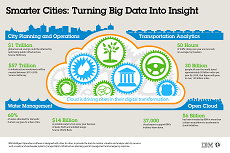October 15, 2013
New Smart City Forum to capitalise on $400 billion global sector
London, Dublin, Barcelona, Boston and Bristol have something in common – they’re smart cities that use intelligent technology to monitor their urban infrastructure. The data is used in a variety of ways; to save money, minimise waste, measure water usage and manage transport routes. Solutions range from utilising IBM’s ‘Big Data’ to analyse traffic congestion on Dublin’s public transport network, to monitoring greenhouse gas emissions from Boston’s buildings. The smart cities industry has been valued at more than $400 billion globally by 2020, with the UK expected to gain a 10 per cent share ($40 billion). Now the government has announced it is to set up a new Smart Cities Forum, chaired by Universities and Science Minister David Willetts and Cities Minister Greg Clark, with representatives from cities, business, and scientists.
Commenting on the launch David Willetts said: “With around 80 per cent of the UK’s population living in cities, we need to ensure that they are fit for purpose in the digital age. Through our information economy strategy we will support cities to improve energy efficiency, reduce carbon emissions and save money.”
A new report ‘Global Market Opportunities and UK Capabilities for future smart cities’ has also been published which highlights how the technology could transform lives and provide an economic boost.
Volker Buscher, Arup Director and Smart Cities Forum member, who wrote the report, said: “By 2050, the human population will have reached 9 billion people with 75 per cent of the world’s inhabitants living in cities. Smart technologies can help address some of the challenges of rapid urbanisation by improving services and managing their efficiency.
“We already have incredible academics and professionals in the UK so we are well equipped to capitalise on this growing market and help create a better environment for us all.”
The government has already invested around £95 million of research into smart cities funded by Research Councils UK, £50 million over five years earmarked for the new Future Cities Catapult centre being established by the Technology Strategy Board in London, and £33 million invested in future city demonstrators earlier this year.















